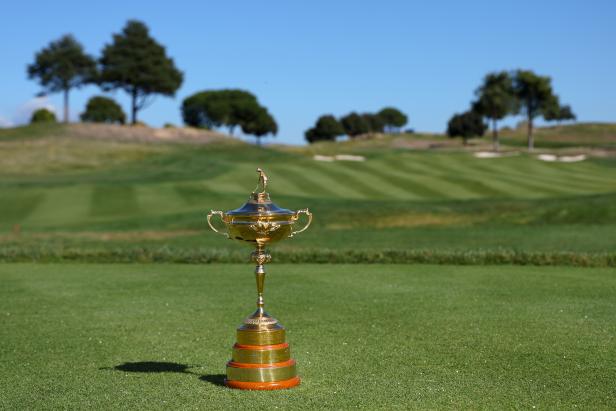In 2021, when almost the entire U.S. team—players, caddies, and captains—took a trip to Whistling Straits a few weeks before the Ryder Cup (only Brooks Koepka, nursing a wrist injury, missed out), the captains were asked to describe the purpose of that trip.
“They had us over a barrel in Paris because we didn’t have enough practice rounds,” Davis Love III, a vice captain, said at the time. “The other team knew the golf course way better … it’s important for us to gather local knowledge and pass it on to the guys who don’t have the intimate knowledge as guys like DJ.”
Added captain Steve Stricker, “My message from Day 1 has been to try and out-prepare the European team, and for me it’s been that way throughout my career, just trying to prepare the best as I can going into events. So, let’s get in as much practice as we can here, maybe take a little bit of the stress of Ryder Cup week off our plates by getting our work done now … and get some rest that week.”
The U.S. won that Ryder Cup in a blowout, and whether the team trip made much of a difference is a matter of debate. What’s not up for debate is how important they thought it was, both for course knowledge and team bonding, and this year’s U.S. captain Zach Johnson—flanked by Love, Stricker, and many of the same players from Whistling Straits—carried that belief forward. At his introductory press conference in February 2022, he was already talking about the possibility of getting the team to Marco Simone outside of Rome ahead of the Ryder Cup, Sept. 29-Oct. 1.
“Steve did a great job of that. He made it a priority,” Johnson said. “Some of those young guys had not seen it. What he did was make it a priority to get the team there, prior, and made that an emphasis.
“This is not Wisconsin, clearly. It’s not an ideal situation, and it’s something we’ve talked about and will continue to talk about and hopefully find a way to do that. It’s not going to be easy but we’re looking into it. That would be the most ideal, just to get everybody’s on site prior.”
Johnson continued to emphasize the point in the smaller media huddle after the press conference ended, and now, more than a year and a half later, he made good on his wish. This past weekend, nine members of the team—all but Jordan Spieth, who missed it for the impending birth of his child, and Xander Schauffele and Patrick Cantlay, who missed for personal reasons—traveled together to Rome with the captains to play the course and have some private moments as a group before the chaos of the Cup.
Among the tangibles they discovered—that the rough is growing in thick, which is purportedly what Euro captain Luke Donald desires.
“The common sentiments that I heard on the golf course was they really liked it, which is awesome,” Johnson told the Associated Press. “And I knew they would because Marco Simone is very, very good. The rough was very thick. That was the other nugget that we talked about a lot.
“The putting greens were very good, very true, very nice,” he continued. “The fairways were awesome. It’s a great test and it’s a really, really good match play golf course. So the guys are excited about the competition.”
As much as visiting Whistling Straits ahead of the last Cup may have helped, the importance is heightened in a European year. It’s been three decades since the U.S. managed to win away from home, and while the new era established by the post-Gleneagles task force has been successful by almost any measure, Paris in 2018—where the Europeans won 17½-10½— showed that without on-site preparation, no amount of firepower or careful planning can hold off the tide of home- course advantage. This year, the Europeans are hosting on a layout they’ve played four times in the DP World Tour’s Italian Open. The Americans were caught without experience at Le Golf National, but a hallmark of the modern U.S. Ryder Cup leadership system is that mistakes like these double as learning opportunities.
Stricker made sure he wouldn’t get fooled again in Whistling Straits, and despite the logistical difficulties, Johnson pulled it off as well as he could in Italy. Now, the players know the course better—and maybe even each other—than they did before and have stolen a little of the overwhelming element of surprise that Europe has used to its advantage so effectively over the decades. The task of actually winning remains hard, but with margins this small, every little bit makes a difference.
Team USA needs 14 points over three days at Marco Simone to retain the Cup, and they just made their job a lot easier.
